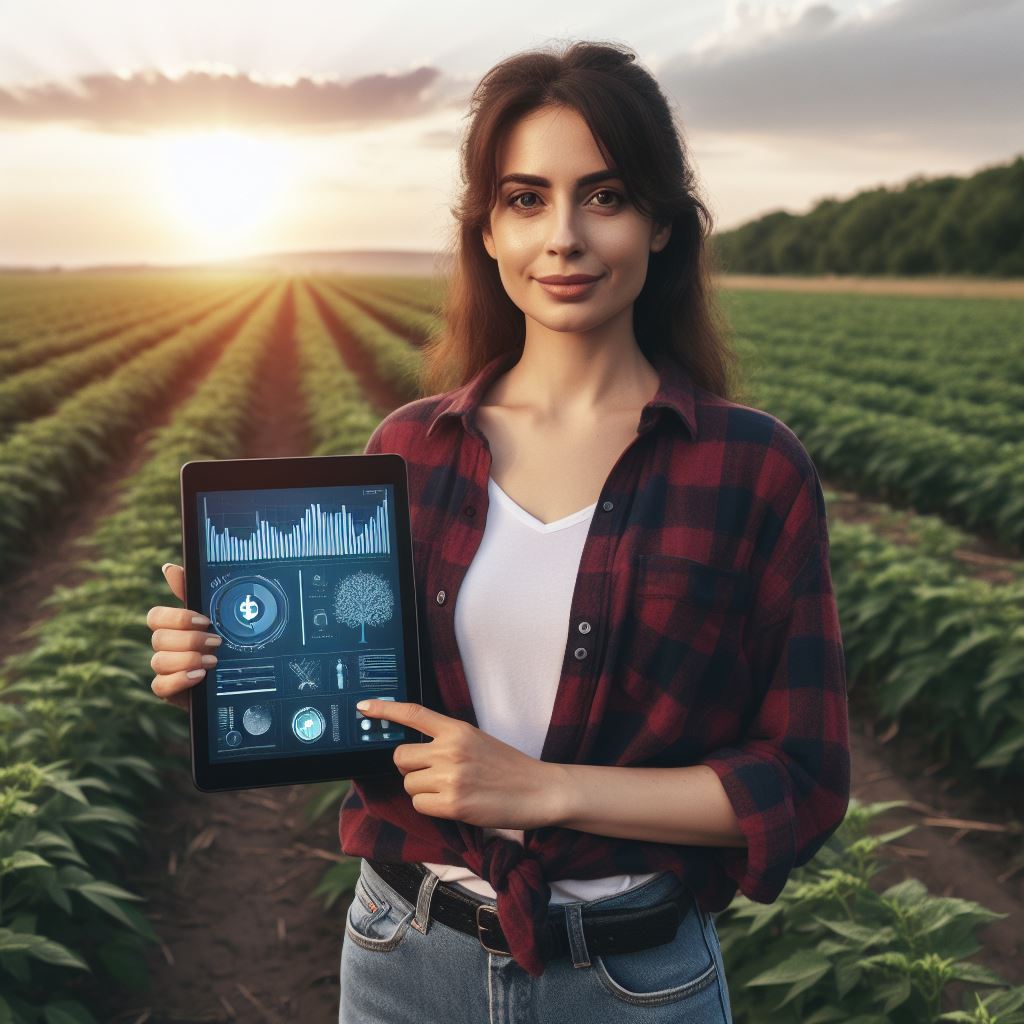Introduction
Technology has revolutionized various industries, including agriculture.
In recent years, the concept of tech-enhanced agri supply chains has gained significant momentum.
This approach utilizes the power of technology to streamline and optimize supply chain activities in the agricultural sector.
Traditionally, agriculture supply chains were characterized by manual processes and inefficient communication systems.
However, with the advent of technology, these chains have witnessed a drastic transformation.
The integration of advanced technologies, such as internet of things (IoT), artificial intelligence (AI), and data analytics, has revolutionized the entire supply chain, right from farm to fork.
The importance of technology in agri supply chains cannot be overstated.
It has led to improved traceability and transparency, allowing stakeholders to better track the movement of products.
This not only ensures food safety but also helps in identifying and resolving issues more effectively.
Furthermore, technology has enabled better forecasting and demand planning in agriculture supply chains.
Through data analysis and predictive modeling, farmers and suppliers can anticipate market trends, optimize production, and minimize wastage.
This not only maximizes profits but also reduces the environmental impact of farming practices.
Moreover, technology has improved communication and collaboration among stakeholders, facilitating real-time information sharing.
This enables faster decision-making, enhances coordination, and enables immediate response to challenges or changes in the supply chain.
In fact, the adoption of technology in agriculture supply chains has revolutionized the way the industry operates.
It has brought numerous benefits, including improved efficiency, enhanced productivity, and greater sustainability.
Tech-enhanced agri supply chains are the way forward to meet the growing demands of a rapidly changing world.
Current Challenges in Agri Supply Chains
In this section, we will explore the current challenges in agri supply chains, highlighting the existing issues and inefficiencies in traditional supply chains.
We will also discuss the impact of these challenges on farmers, distributors, and consumers, and emphasize the need for innovative solutions.
The existing issues and inefficiencies in traditional supply chains
- Limited visibility and traceability: Traditional supply chains often lack transparency, making it difficult to trace the origin and movement of agricultural products.
- Inefficient logistics and transportation: Poor infrastructure and inadequate transportation systems result in delays, spoilage, and increased costs.
- Fragmented information flow: Information exchange between different stakeholders in the supply chain is often manual, time-consuming, and prone to errors.
- Poor quality control: Farmers face challenges in maintaining consistent product quality due to limited access to resources and technical expertise.
- High post-harvest losses: Storage facilities and techniques used in traditional supply chains are often inadequate, leading to significant post-harvest losses.
The impact of these challenges on farmers, distributors, and consumers
- Financial impact on farmers: Due to inefficiencies in supply chains, farmers experience reduced profitability and income instability.
- Limited market access for farmers: Inadequate supply chain infrastructure makes it challenging for farmers to reach larger markets and obtain fair prices for their produce.
- Inflation and food price volatility: Inefficient supply chains contribute to price fluctuations, making it difficult for consumers to plan their budgets and impacting food security.
- Product wastage and food shortages: Inefficient storage and transportation systems result in product wastage, while supply chain disruptions lead to food shortages in certain regions.
- Lack of real-time market data: Limited information flow hinders farmers and distributors from making informed decisions and responding to market trends effectively.
The need for innovative solutions
- Adopting technology-driven solutions: Integrating digital tools, such as IoT sensors, blockchain, and data analytics, can enhance supply chain visibility and efficiency.
- Building collaborative networks: Encouraging partnerships between farmers, distributors, and logistics providers can streamline information flow and strengthen supply chains.
- Investing in infrastructure development: Improving transportation, storage facilities, and communication networks will reduce post-harvest losses and enhance overall supply chain performance.
- Empowering farmers through training and support: Providing farmers with necessary training, knowledge, and access to resources enables them to produce higher-quality products and effectively navigate the supply chain.
- Enabling market intelligence and forecasting: Utilizing data analytics and market intelligence tools can enable farmers and distributors to make data-driven decisions and respond to market dynamics in real-time.
By addressing the inefficiencies in traditional agri supply chains and implementing innovative solutions, we can create a more sustainable and resilient agricultural sector that benefits farmers, distributors, and consumers alike.
Read: Maximizing Profits in Farming Ventures
Overview of Tech-Enhanced Agri Supply Chains
Agriculture has always been an essential part of our lives, providing food and raw materials.
However, in recent years, advancements in technology have revolutionized the way we manage and optimize agri supply chains.
Tech-enhanced supply chains play a crucial role in improving efficiency, reducing waste, and ensuring sustainability.
Definition and explanation of tech-enhanced supply chains
Tech-enhanced supply chains refer to the integration of various technologies to enhance the management and operations of agricultural supply chains.
These technologies provide real-time data, optimize processes, and improve decision-making.
Various technologies used in agri supply chains
- Internet of Things (IoT): IoT devices such as sensors, cameras, and RFID tags are used to collect and transmit data about crops, soil conditions, and storage facilities. This data helps in monitoring and optimizing the supply chain processes.
- Blockchain: Blockchain is a decentralized and immutable digital ledger that enables secure and transparent transactions. It can be used in agri supply chains to track and trace the origin, quality, and movement of agricultural products.
- Artificial Intelligence (AI): AI technologies like machine learning and predictive analytics help in analyzing vast amounts of data collected from various sources. This enables better demand forecasting, inventory management, and decision-making.
- Drones: Drones equipped with imaging sensors and GPS capabilities are used in agriculture for crop monitoring, pest control, and crop spraying. They provide valuable data for precision farming and yield optimization.
The role of each technology in improving supply chain operations
- Internet of Things (IoT): IoT devices enable real-time monitoring of environmental factors, such as temperature, humidity, and soil moisture. This data helps farmers optimize irrigation, reduce waste, and ensure optimal growing conditions. IoT also aids in tracking the movement of products throughout the supply chain, ensuring timely delivery and reducing spoilage.
- Blockchain: Blockchain technology provides transparency and trust in agri supply chains. It allows farmers, suppliers, and consumers to track and verify the origin, quality, and certifications of agricultural products. This enhances food safety and enables fair trade practices. Blockchain also facilitates streamlined and secure transactions, reducing the need for intermediaries.
- Artificial Intelligence (AI): AI-powered analytics algorithms analyze large datasets from multiple sources, providing valuable insights for supply chain optimization. AI can predict demand fluctuations, optimize inventory levels, and suggest the most efficient transportation routes. AI algorithms can also detect and prevent food fraud and contamination, ensuring food safety and quality.
- Drones: Drones offer a wide range of applications in agri supply chains. They can capture aerial imagery and collect data on crop health, allowing farmers to detect diseases, nutrient deficiencies, and weed infestations. Drones also enable precise spraying of fertilizers and pesticides, reducing environmental impact and improving crop yields. With their ability to cover large areas quickly, drones improve efficiency in crop monitoring and surveillance.
In general, the integration of various technologies in agri supply chains has brought numerous benefits.
Tech-enhanced supply chains optimize operations, reduce waste, ensure food safety, and improve overall sustainability.
As technology continues to advance, it is essential for agricultural stakeholders to embrace these innovations and leverage their potential for a more efficient and resilient agricultural sector.
Read: Effective Marketing for Modern Farmers
Benefits of Tech-Enhanced Agri Supply Chains
Enhanced traceability and transparency
- Technology enables real-time tracking of products from farm to consumer, ensuring transparency.
- It allows consumers to have access to detailed information about the origin and quality of products.
- Traceability helps identify the source of any product-related issues, preventing outbreaks and quickly resolving them.
- By providing accurate information on the supply chain, technology builds consumer trust and strengthens brand reputation.
- Enhanced traceability also enables better compliance with existing regulations and standards.
Improved efficiency and productivity
- Automation and digitalization in agri supply chains streamline processes, reducing manual and time-consuming tasks.
- Technology-enabled data analytics help optimize operations, improving resource allocation and supply chain planning.
- Smart inventory management systems prevent stockouts and overstocking, optimizing storage and minimizing waste.
- Real-time data sharing among stakeholders enables better coordination, reducing delays and bottlenecks.
- Increased efficiency and productivity lead to cost savings, better resource utilization, and overall profitability.
Reduction of waste and losses
- Technology allows farmers and suppliers to gather precise data on crops, leading to more accurate forecasting.
- Data-driven insights help optimize harvesting, storage, and transportation, reducing post-harvest losses.
- Monitoring tools and IoT devices minimize spoilage by providing timely alerts on temperature, humidity, and pest control.
- Improved supply chain visibility enables better inventory management, reducing waste due to expired or damaged goods.
- Reduction in waste and losses not only benefits farmers financially but also promotes sustainability and food security.
Increased profitability for farmers
- Tech-enhanced supply chains provide fair pricing mechanisms by eliminating intermediaries and ensuring direct farmer-consumer connections.
- Direct access to markets and larger customer bases empower farmers to negotiate better deals and increase profits.
- Efficient logistics and reduced post-harvest losses lead to cost savings, improving financial returns for farmers.
- Digital platforms enable farmers to access financial services, insurance, and credit, fostering economic growth.
- Increased profitability enhances livelihoods, attracts investments, and drives agricultural development.
Better quality control and safety measures
- Technology enables real-time monitoring and quality control throughout the entire supply chain.
- Sensors and IoT devices track temperature, conditions, and environmental factors, ensuring product safety and freshness.
- Automated systems detect and remove contaminated or substandard goods, preventing them from reaching consumers.
- Digital platforms allow for better compliance with food safety regulations, guaranteeing higher standards.
- Advanced technologies like blockchain can create immutable records, enhancing trust and ensuring food safety.
In short, tech-enhanced agri supply chains offer numerous benefits.
Enhanced traceability and transparency build trust, while improved efficiency and productivity reduce waste and enhance profitability.
Additionally, better quality control and safety measures ensure consumer satisfaction and compliance with regulations. Embracing technology in agriculture is crucial for sustainable and resilient food systems.
Read: Navigating Finance in Agribusiness
Transform Your Agribusiness
Unlock your farm's potential with expert advice tailored to your needs. Get actionable steps that drive real results.
Get Started
Success Stories and Examples
Case Studies and Success Stories of Tech-Enhanced Supply Chains
Implementing tech-enhanced supply chains in the agricultural industry has proven to be a game-changer for many farms and companies.
Let’s take a look at some successful examples and case studies:
- Green Thumb Farms: This family-owned potato farm in Maine implemented an IoT-based supply chain management system. By tracking and analyzing data from sensors placed on their crops and equipment, they were able to optimize their operations. As a result, they experienced a 15% reduction in waste and a significant increase in productivity.
- Young’s Market Company: This beverage distributor in California embraced technology to enhance their supply chain. They adopted a mobile app that allowed their drivers to optimize their routes in real-time, reducing delivery time and fuel consumption. These improvements led to 20% savings in transportation costs and a positive environmental impact.
- Hellmann’s: This global food company implemented blockchain technology in their supply chain to ensure transparency and traceability. By tracking the journey of their ingredients from farm to table, they were able to build trust with customers, improve food safety, and reduce the risk of fraud. This technology also helped them identify and solve bottlenecks in their supply chain, leading to cost savings and increased efficiency.
Positive Outcomes and Achievements
The implementation of tech-enhanced supply chains has brought about numerous positive outcomes and achievements for farms and companies alike.
Here are some notable examples:
- Cost Savings: By utilizing technologies such as IoT, AI, and automation, farms and companies have been able to optimize their processes, reduce waste, and cut down on unnecessary expenses. This has resulted in significant cost savings, improving their bottom line.
- Time Efficiency: Tech-enhanced supply chains have enabled farms and companies to streamline their operations and eliminate manual, time-consuming tasks. Automation and real-time data analysis have enhanced decision-making processes, reducing lead time and improving overall efficiency.
- Environmental Impact: By implementing technology-driven supply chains, farms and companies have been able to reduce their environmental footprint. Optimized route planning, energy-efficient machinery, and better waste management practices have led to decreased fuel consumption, reduced carbon emissions, and overall sustainability.
- Improved Quality and Safety: Technology allows for better tracking and monitoring throughout the supply chain, ensuring the quality and safety of products. Real-time data analysis helps identify potential risks or issues, enabling timely interventions and ultimately increasing customer satisfaction.
- Enhanced Collaboration: Tech-enabled supply chains encourage collaboration among various stakeholders in the industry. Farmers, distributors, retailers, and consumers can seamlessly share information, which leads to better coordination and improved overall supply chain performance.
These success stories and positive outcomes demonstrate the transformative power of implementing tech-enhanced supply chains in agriculture.
Farms and companies that have embraced these technologies have not only seen financial benefits but also contributed to a more sustainable and efficient future for the agricultural industry.
Read: Farming in the Digital Age
Potential Challenges and Limitations
Possible barriers to adopting tech-enhanced supply chains
Lack of awareness and understanding of the benefits and potential of technology.
Resistance to change among stakeholders and traditional mindset in the agriculture sector.
Inadequate access to technology and digital infrastructure in rural areas.
Limited availability of skilled workforce with technical expertise in the agricultural domain.
Concerns related to cost, infrastructure, and technical know-how
The initial investment required for implementing tech-enhanced supply chains can be a significant barrier.
Inadequate infrastructure, such as reliable internet connectivity, can hinder the adoption of technology.
Limited technical know-how and digital literacy among farmers and other stakeholders.
Strategies for overcoming these challenges
Increasing awareness through effective communication and education about the benefits of tech-enhanced supply chains.
Encouraging collaboration and partnerships between technology providers and agricultural organizations.
Investing in rural infrastructure development, including improving internet connectivity and access to reliable power supply.
Providing training and capacity-building programs to enhance the technical skills of farmers and other stakeholders.
Offering financial incentives and subsidies to reduce the initial cost burden of adopting technology.
Creating user-friendly and intuitive technological solutions that require minimal technical know-how.
Establishing support networks and helplines to assist farmers and stakeholders in troubleshooting technical issues.
Formulating policies and regulations that promote the adoption and integration of technology in agriculture.
In review, while the adoption of tech-enhanced supply chains in agriculture offers significant benefits, it is important to acknowledge and address the potential challenges and limitations.
By understanding the barriers, addressing concerns related to cost, infrastructure, and technical know-how, and implementing appropriate strategies, the agricultural sector can successfully embrace technology and establish efficient and resilient supply chains.
Future Outlook
Trending Developments in Agri Technology
- Use of drones: Drones are being increasingly used in agriculture for tasks like crop monitoring and spraying.
- Internet of Things (IoT): IoT devices and sensors are being used to collect data on soil moisture, crop growth, and weather conditions.
- Artificial Intelligence (AI): AI applications such as machine learning algorithms are helping farmers analyze data and make informed decisions.
- Robotics and automation: Robots are being employed in various agricultural tasks like harvesting, sorting, and packaging.
- Blockchain technology: Blockchain is being explored as a solution for improved transparency and traceability in the supply chain.
Future Potential of Tech-Enhanced Supply Chains
- Increased efficiency: The integration of technology in supply chains can optimize processes, reduce waste, and improve productivity.
- Enhanced traceability: Technology enables accurate tracking of produce from farm to fork, ensuring food safety and quality.
- Data-driven decision making: With the help of technology, farmers can analyze data to make informed decisions about irrigation, fertilization, and pest control.
- Improved market access: Tech-enhanced supply chains can facilitate better market access for farmers, connecting them directly to consumers.
Role of Startups, Government Initiatives, and Collaborations in Driving Innovation
- Startups: Startups are developing innovative solutions in areas like precision agriculture, farm management software, and supply chain optimization.
- Government initiatives: Governments are investing in agri-tech research, providing funding, and promoting policies that support the adoption of technology in agriculture.
- Collaborations: Collaborations between technology companies, agricultural organizations, and research institutions are fostering innovation and knowledge sharing.
- Knowledge transfer: Startups and tech companies are playing a crucial role in transferring technological knowledge and expertise to farmers.
- Sustainability focus: Many startups and initiatives are focused on developing sustainable and environmentally friendly technologies for agriculture.
Overall, the future of tech-enhanced agri supply chains looks promising.
The advancements in agri technology are revolutionizing the way farming is done.
With the integration of drones, IoT, AI, and robotics, farmers can expect increased efficiency, better traceability, and data-driven decision making.
The use of blockchain technology can provide transparency and accountability throughout the supply chain.
Startups, government initiatives, and collaborations are driving innovation and supporting the adoption of technology in agriculture.
With their efforts, farmers can embrace these advancements and thrive in the evolving agri-tech landscape.
Conclusion
Tech-enhanced agri supply chains play a crucial role in revolutionizing agriculture by streamlining processes, increasing efficiency, and maximizing yields.
The benefits are numerous, ranging from reduced waste and costs to improved quality and traceability.
By incorporating technology into agriculture, farmers can access real-time data, implement precision farming techniques, and make informed decisions to optimize their operations.
This not only improves productivity but also ensures sustainable practices and reduces environmental impact.
As we move towards a more technologically advanced era, it is essential for farmers, suppliers, and stakeholders to embrace the potential of technology in agriculture.
By exploring innovative solutions like IoT sensors, data analytics, and automation, they can unlock new possibilities for growth and profitability.
Embracing technology not only benefits individual farmers but also contributes to global food security.
With an increasing population and growing food demands, it is crucial to leverage technology to enhance the efficiency and productivity of agri supply chains.
In closing, the future of agriculture lies in embracing technology and creating tech-enhanced supply chains that revolutionize the way we produce and distribute food.
Let us join hands in harnessing the power of technology to create a sustainable and resilient agricultural sector that meets the challenges of the 21st century.




